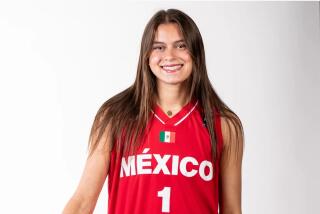‘Passport swapping’ is still popular in Olympic sports. Here’s one story.
- Share via
The trip to Mexico was supposed to last a couple of days.
As a teenager climbing the ranks in the sport of taekwondo, Jackie Galloway was merely looking for experience when she traveled across the border from her Texas home to a tournament in Torreon.
Everything changed when she unexpectedly won gold, defeating a former world champion.
Mexican coaches discovered Galloway had dual citizenship through her mother. They offered her a spot on the national team and asked her to move into their training center immediately.
“I was like, ‘Wait,’” she recalled. “I had finals for my freshman year in high school the next week.”
The 14-year-old faced a difficult choice — she felt hesitant about leaving her family but was tempted by the chance to train full-time and fight in tournaments around the world.
“I discussed it with my parents,” she said. “It was an opportunity we just couldn’t pass up.”
That quickly, Galloway joined the ranks of “passport swapping” athletes who switch allegiances to compete under another flag. Some go where it is easier to make the national squad; others are lured away by wealthy nations that pay for talent.
This story is slightly different. Over the next two years, as Galloway competed in a foreign land, her Olympic dreams stayed close to home.
“My heart was with the U.S.,” she says. “It was always my plan to have that ‘USA’ on my back.”
--
The International Olympic Committee has long wrestled with the issue of athletes changing nationalities.
The practice dates to the 1920s and ‘30s when England and the U.S. stocked their ice hockey teams with Canadian players. Passport swapping grew steadily more popular over the years.
Most recently, oil-rich emirates such as Qatar and Bahrain – eager to boost their national prestige – have recruited world-class runners from Africa.
“From a moral standpoint, we should avoid this transfer market in athletes,” former IOC president Jacques Rogge said in the early 2000s. “What we don’t like is athletes being lured by large incentives by other countries and giving them a passport when they arrive at the airport.”
At the 2014 Sochi Olympics, at least 120 athletes – about 4% of the total – competed for countries other than their birth nations, according to a data analysis by the Pew Research Center.
Canada, Russia and the U.S. were among the teams with the most passport athletes. At the same time, several American figure skaters avoided the cut-throat selection in this country to compete instead for Brazil and Lithuania.
The Olympic Charter allows for such moves when athletes hold dual citizenship or formally change their nationality.
“Legally, we cannot stop it,” Rogge said. “But it does not mean that we love it.”
--
In 2010, there wasn’t much question that Galloway would accept the Mexican team’s offer.
Her family ran a small taekwondo studio in Garland, Texas, teaching the Korean style of martial arts. Like her father, Gary, who had competed nationally, Galloway started young and showed early signs of promise.
“Look, you can’t replace the experience you’ll get in Mexico,” her dad recalled telling her. “And we don’t have the money to send you to all those events.”
Though the move was logical, it wasn’t easy. Galloway was the youngest athlete on the team and spoke almost no Spanish, essentially living on her own at a Mexico City training center.
“I was attending school online but I don’t know how much schoolwork I was actually doing,” she said. “I was definitely homesick.”
Two things kept her going – regular visits with family and a devotion to the sport.
Galloway grew strong from training with older teammates and gained experience from a steady diet of international tournaments.
Competing under her mother’s maiden name – Sanchez – she won a youth bronze at the 2011 Pan American Championships and, the following year, medaled at tournaments in the U.S. and the Netherlands.
Still young at 16, she barely missed making the 2012 Olympic team for Mexico. Her disappointment was tempered by another emotion.
After two years on her own, she said, “it was time to go home.”
--
The IOC attempts to curb passport swapping: Any athlete who represents a country in a major competition must wait three years before competing for another country in the Olympics.
Galloway’s return to Texas gave her enough time to re-establish herself as an American for the 2016 Summer Games.
In the meantime, she attended high school back home. “I was never the typical student, going to football games and things like that, but I wanted to finish,” she says. And she continued fighting.
Her 2014 season included medals at tournaments in Canada, Germany and Korea. The following year, she defeated former Mexican teammate Maria Espinoza to win gold at the Pan American Games and later took bronze at the world championships.
Often facing larger women at 67 kilograms (about 148 pounds) and above, she became known as a quick thinker.
“There are so many different body types and body styles in her weight division,” said her father, who still coaches her. “She can’t have the same approach for every opponent … she has to solve each one differently.”
Returning from a Grand Prix event in December, Galloway ran into the head of the national taekwondo federation in baggage claim in Dallas. He told her that she had qualified for the U.S. Olympic team.
The 20-year-old flashed back on all the years of hard work and time away from loved ones. She thought about the circuitous route she had taken to the 2016 Summer Games in Rio de Janeiro.
“I held it together and got my bags,” she said. “As soon as I got outside … tears.”
More to Read
Go beyond the scoreboard
Get the latest on L.A.'s teams in the daily Sports Report newsletter.
You may occasionally receive promotional content from the Los Angeles Times.







